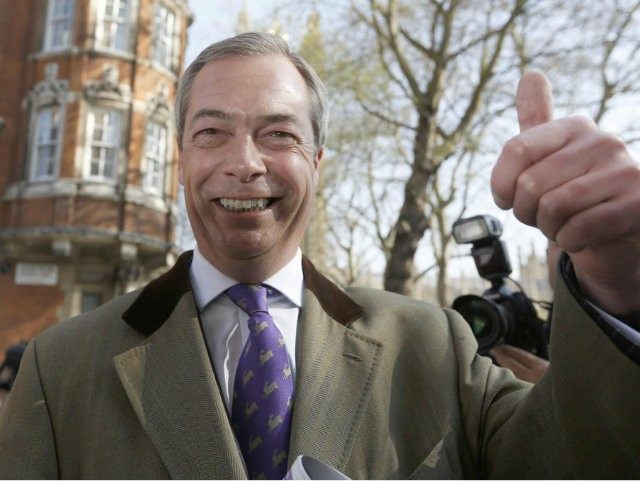Speaking to reporters outside yesterday’s European Council summit of EU leaders in Brussels, UKIP leader Nigel Farage set out a positive case for the Out side of the promised In/Out referendum. The comments, recorded by EurActiv.com, signal the rejection of a “two fingers up to Brussels” approach in favour of an optimistic global vision for a post-Brexit Britain, countering critics who have accused him of negativity in the past.
That’s not to say he avoided the opportunity to have any digs at rival politicians. Asked what his dream scenario regarding renegotiation at the summit would be, Farage replied:
“I think what will happen is, by the time we get to the conference there’ll be a little hand at the back which says ‘please sir, can I say something?’, ‘oh yeah, come on Cameron, what is it?’, they’re busy with other things.”
Pushed to expand upon what Britain’s negotiators can actually achieve he predicted:
“Three fifths of five eighths of very little, you’ve got Greece perhaps on the verge of being booted out of the euro, the biggest migrant crisis the European Union has ever faced in its history, virtual rioting in Calais, you know I don’t think British renegotiation on a very narrow area of benefits for migrant workers is going to be very high on the agenda, do you? It just isn’t going to get discussed.”
Having mentioned Greece he was asked whether he believes the Greeks have anything to lose, an idea on which he quickly poured cold water:
“I think the Greeks have everything to gain. I think you only have to look at what happened to Iceland back in ’08/9 to see that if a country is in real trouble, as the Icelandics were and Greece is, that actually devaluation, default and then if you put in place some sensible economic policies, actually you can get a country back to growth fairly quickly.”
Turning his attention back to Britain, Farage then spoke of Norway’s experience outside the EU:
“If little countries like Norway can sort out out their own arrangements the way they have, then a whopping great big country like Britain, who is the Eurozone’s biggest export market in the world, can sort out an even better position.”
At this point a journalist challenged Farage’s view on Iceland, warning that the country has no influence in Brussels but still has to obey the rules set there in order to trade with the EU. Warming to the theme of an optimistic future for a global-facing Britain he replied:
“How much influence do we have in America? How much influence do we have in Japan? If we sell product to any other part of the world we have to comply with their laws. This idea that just because of this shrinking backyard that is called Europe – yes it’s an important marketplace but diminishing every year that goes by – actually the idea that if you harmonise, homogenise, standardise and pasteurise everything there are enormous trade benefits, I don’t believe that. Actually I believe in competition, whether it’s tax competition or regulatory competition, and I think that actually leads to better markets and better consumer choice than this EU model.”
A journalist then raised the issue of tariff barriers being raised between the EU and Britain damaging the post-Brexit economy. Farage again replied positively:
“Through global trade liberalisation the worst case scenario is the French and Germans say ‘right, we’re going to do everthing we can to ruin our biggest export market, we’re going to put tariffs on British products’, even those tariffs will only be 2.5 per cent. Our membership fee to the EU alone is bigger than the cost of those tariffs will be. So even the worst case scenario for Britain in terms of a trade deal with Europe is good. The best case scenario is the common sense scenario that Mercedes and all the other companies say ‘do you know what? We quite like the British market, let’s do a sensible free trade deal’, and then we’re free to make our own global, bilateral trade deals with any country we choose.”
Farage concluded the Q&A session by summarising the approach the Out Campaign is likely to adopt:
“The Eurosceptics in Britain are not saying ‘two fingers up to Brussels, we hate the EU, we’re going to set fire to the flag’, actually what we’re saying is this thing now is an encumbrance upon us in the modern global economy and we can do a damn sight better without it.”

COMMENTS
Please let us know if you're having issues with commenting.